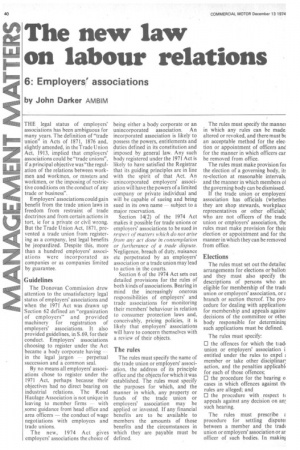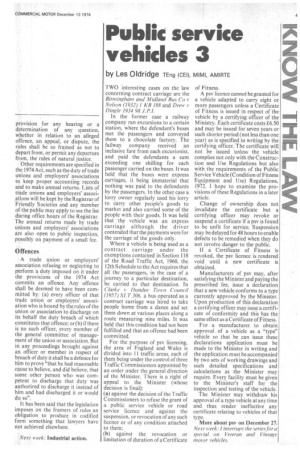The new law on labour relations
Page 42

Page 43

If you've noticed an error in this article please click here to report it so we can fix it.
6: Employers' associations
by John Darker AMBIM THE legal status of employers' associations has been ambiguous for many years. The definition of "trade union" in Acts of 1871, 1876 and, slightly amended, in the Trade Union Act, 1913, implied that employers' associations could be "trade unions", if .a principal objective was "the regulation of the relations between workmen and workmen, or masters and workmen, or the imposing of restrictive conditions on the conduct of any trade or business", Employers' associations could gain benefit from the trade union laws in freedom from restraint of trade doctrines and from certain actions in tort, ie for a private or civil wrong. But the Trade Union Act, 1871, prevented a trade union from registering as a company, lest legal benefits be jeopardized. Despite this, more than a hundred employers' associations were incorporated as companies or as companies limited by guarantee.
Guidelines
The Donovan Commission drew attention to the unsatisfactory legal status of employers' associations and when the 1971 Act was drawn up Section 62 defined an "organization of employers" and provided machinery for registration of employers' associations. It also provided guidelines, in 5.69, for their conduct. Employers' associations choosing to register under the Act became a body corporate having — in the legal jargon — perpetual succession and a common seal.
By no means all employers' associations chose to register under the 1971 Act, perhaps because their objectives had no direct bearing on industrial relations. The Road Haulage Association is not unique in leaving to member firms with some guidance from head office and area officers — the conduct of wage negotiations with employees and trade unions.
The new, 1974 Act gives employers' associations the choice of being either a body corporate or an unincorporated association. An incorporated association is likely to possess the powers, entitlements and duties defined in its constitution and imposed by general law. Any such body registered under the 1971 Act is likely to have satisfied the Registrar that its guiding principles are in line with the spirit of that Act. An unincorporated employers' association will have the powers of a limited company or private individual and will be capable of sueing and being sued in its own name — subject to a major reservation.
Section 14(2) of the 1974 Act makes it possible for trade unions or employers' associations to be sued in respect of matters 14,hich do not arise .from any act done in contemplation or .furtherance of a trade dispute. Negligence, breach of duty, nuisance etc perpetrated by an employers' association or a trade union may lead to action in the courts.
Section 6 of the 1974 Act sets out detailed provisions for the rules of both kinds of associations. Bearing in mind the increasingly onerous responsibilities of employers' and trade associations for monitoring their members' behaviour in relation to consumer protection laws and, conceivably, pricing policies, it is likely that employers' associations will have to concern themselves with a review of their objects.
The rules
The rules must specify the name of the trade union or employers' association, the address of its principle office and the objects for which it was established. The rules must specify the purposes for which, and the manner in which, any property or funds of the trade union or employers' association may be applied or invested. If any financial benefits are to be available to members the amounts of those benefits and the circumstances in which they are payable must be defined. The rules must specify the mannei in which any rules can be made altered or revoked, and there must be an acceptable method for the election or appointment of officers and for the manner in which officers car be removed from office.
The rules must make provision foi the election of a governing body, it re-election at reasonable intervals, and the manner in which members 01 the governing body can be dismissed.
If the trade union or employers' association has officials (whethei they are shop stewards, workplace representatives or other officials', who are not officers of the trade union or employers' association, the rules must make provision for their election or appointment and for the manner in which they can be removed from office.
Elections
The rules must set out the detailec arrangements for elections or ballot and they must also specify tilt descriptions of persons who are eligible for membership of the tradt union or employers' association, or E branch or section thereof. The pro. cedure for dealing with applicatiow for membership and appeals agains' decisions of the committee or °the] body responsible for determiniq such applications must be defined.
The rules must specify: LI the offences for which the tradi union or employers' association i entitled under the rules to expel member or take other disciplinar: action, and the penalties applicabli for each of those offences; D the procedure for the hearing o cases in which offences against thl rules are alleged; and the procedure with respect t( appeals against any decision on an: such hearing.
The rules must prescribe E procedure for settling dispute! between a member and the trach union or employers' association or ar officer of such bodies. In makinl provision for any hearing or a determination of any question, whether in relation to an alleged offence, an appeal, or dispute, the rules shall be so framed as not to depart from, or permit any departure from, the rules of natural justice.
Other requirements are specified in the 1974 Act, such as the duty of trade unions and employers' associations to keep proper accounting records and to make annual returns. Lists of trade unions and employers' associations will be kept by the Registrar of Friendly Societies and any member of the public may apply to see the list during office hours of the Registrar. The annual returns made by trade unions and employers' associations are also open to public inspection, possibly on payment of a small fee.
Offences
A trade union or employers' association refusing or neglecting to perform a duty imposed on it under the provisions of the 1974 Act commits an offence. Any offence shall be deemed to have been committed by: (a) every officer of that trade union or employers' association who is bound by the rules of the union or association to discharge on its behalf the duty breach of which constitutes that offence; or (b) if there is no such officer, every member of the general committee of management of the union or association. But in any proceedings brought against an officer or member in respect of breach of duty it shall be a defence for him to prove "that he had reasonable cause to believe, and did believe, that some other person who was competent to discharge that duty was authorized to discharge it instead of him and had discharged it or would do so".
It has been said that the legislation imposes on the framers of rules an obligation to produce in codified form something that lawyers have not achieved elsewhere.
Next week: Industrial action.




























































































